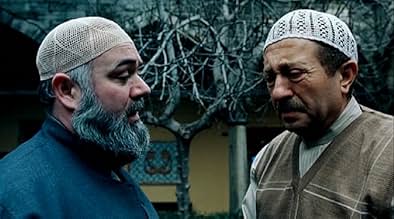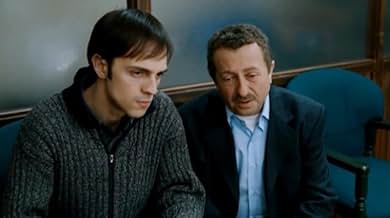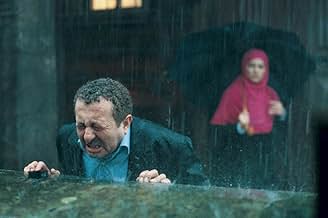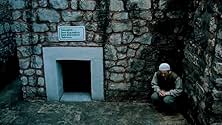Takva
- 2006
- 1 घं 36 मि
IMDb रेटिंग
7.4/10
14 हज़ार
आपकी रेटिंग
अपनी भाषा में प्लॉट जोड़ेंA promotion brings a Muslim's relationship with God into question.A promotion brings a Muslim's relationship with God into question.A promotion brings a Muslim's relationship with God into question.
- पुरस्कार
- 19 जीत और कुल 15 नामांकन
फ़ीचर्ड समीक्षाएं
This is a rare example of an inner look at the Islamic sects and their organizations. Although the movie is a fiction, at times you may think you are watching a documentary of a Turkish Islamic sect and its rituals.
Tha main character, Muharrem is a devout and simple believer and a follower of the sect. He gets selected by his Efendi (sheikh of the sect) for collecting the rent money of the sect. This purely financial act affects Muharrem morally and psychologically.
Erkan Can plays an excellent Muharrem. Guven Kirac (Rauf the vice sheikh) and Meray Ulgen (the sheikh) are very very believable in their roles.
This probably one of the finest examples of the new Turkish cinema.
Tha main character, Muharrem is a devout and simple believer and a follower of the sect. He gets selected by his Efendi (sheikh of the sect) for collecting the rent money of the sect. This purely financial act affects Muharrem morally and psychologically.
Erkan Can plays an excellent Muharrem. Guven Kirac (Rauf the vice sheikh) and Meray Ulgen (the sheikh) are very very believable in their roles.
This probably one of the finest examples of the new Turkish cinema.
10ogsezer
I would like to mention a different side of the movie that sheds light on Sufi or Mevlevi orders in Turkish and Islamic history.
Why Muharrem is selected for this task to perform financial affairs of the order? The answer is related with the stages of knowledge or purity that one has to qualify to become a "Perfect Human Being" or "insan-i kamil" in Turkish. This concept or ideology is rooted with Islamic tradition. Many Sufi or Mevlevi order has this process for their dervishes which may take a lifetime to achieve this goal or even never be able to reach that level of "perfection".
Different than being nun or monk which requires leaving mainstream society and living in the monastery with prayers, last step of this difficult and lengthy process of purifying one's soul from earthly desires, is to be able to return to the real world after so many years lived in contemplation and yet not being disturbed with its appeal to commit sin. I believe in the last few minutes head of the order explains this a little bit. And apparently Muharrem failed to accomplish last stage before achieving "perfection".
Why Muharrem is selected for this task to perform financial affairs of the order? The answer is related with the stages of knowledge or purity that one has to qualify to become a "Perfect Human Being" or "insan-i kamil" in Turkish. This concept or ideology is rooted with Islamic tradition. Many Sufi or Mevlevi order has this process for their dervishes which may take a lifetime to achieve this goal or even never be able to reach that level of "perfection".
Different than being nun or monk which requires leaving mainstream society and living in the monastery with prayers, last step of this difficult and lengthy process of purifying one's soul from earthly desires, is to be able to return to the real world after so many years lived in contemplation and yet not being disturbed with its appeal to commit sin. I believe in the last few minutes head of the order explains this a little bit. And apparently Muharrem failed to accomplish last stage before achieving "perfection".
It's a good movie to get know a profile of the religious Muslims, to get know "sects" and the amazing, fascinating worship of them. To find answers to the questions like; "how does a sect process and what's happening inside of a sect?". But it doesn't give a political message, a movie that "sit on the fence". But I congratulate the director for at least his bravery to submit these kind of sources and to try to answer some questions or to ask some questions. The main actor Erkan Can has a great performance.
Besides the musics that are made by Replicas, (Gokce Akcelik) are great. Enjoy...
Besides the musics that are made by Replicas, (Gokce Akcelik) are great. Enjoy...
I think it goes much to far to call this excellent film a documentary about the life of a Muslim sect or a critique of political Islam or even the role of the religious orders in Turkish economic life. Rather I would like to claim that it gives just an impression of the life Turkish religious orders, society and the mind of a devout religious man who previously led a uncritical life without real challenges and without deep thoughts about practical life and religion. Therefor he's unprepared for both of it.
I would guess that one could find his "state of mind" also with a range of uncritical believers of many religions who, although ardently believe stay shallow in their intellectual penetration of their believe and worldly life. They stay rather caught in conservative dogmas, which where made to control man and are far away from a healthy human experience.
Not everything shown in Film should be taken at face value. The depiction of the ritual life gives an impression of the ecstatic quality of such gatherings but is exaggerated in their frenetic appearance. There may have been reasons for this depiction but one should rather try not to confuse it with the an authentic account; this account one should rather get in contact with real orders.
The protagonist has high values which he fails to satisfy. This puts him in a moral dilemma which is very instructively set in contrast on one hand to worldly every day people and merchants with their cheating and accommodation with an imperfect world. On the other there is a religious order, which although is directed towards spirituality is of course also involved in worldly enterprises and has of course it financial interests. Nothing gets euphemised but the problems of both - profane and spiritual - get expounded in a way that a psychological profile of shallow but devote believer meets social criticism (not only hitting the Turkish Islamic milieu of its setting but also similar ones in other regions and religions).
I would guess that one could find his "state of mind" also with a range of uncritical believers of many religions who, although ardently believe stay shallow in their intellectual penetration of their believe and worldly life. They stay rather caught in conservative dogmas, which where made to control man and are far away from a healthy human experience.
Not everything shown in Film should be taken at face value. The depiction of the ritual life gives an impression of the ecstatic quality of such gatherings but is exaggerated in their frenetic appearance. There may have been reasons for this depiction but one should rather try not to confuse it with the an authentic account; this account one should rather get in contact with real orders.
The protagonist has high values which he fails to satisfy. This puts him in a moral dilemma which is very instructively set in contrast on one hand to worldly every day people and merchants with their cheating and accommodation with an imperfect world. On the other there is a religious order, which although is directed towards spirituality is of course also involved in worldly enterprises and has of course it financial interests. Nothing gets euphemised but the problems of both - profane and spiritual - get expounded in a way that a psychological profile of shallow but devote believer meets social criticism (not only hitting the Turkish Islamic milieu of its setting but also similar ones in other regions and religions).
Saw Takva last night at The Sydney Film Festival 2007, utterly compelling, driven by Erkan Can's fine performance as Muharrem, a devout Muslim in contemporary Istanbul. Previous posts outline more.
I was fascinated by the way Takva engages with contemporary Turkey, a notionally democratic and secular society since the 1920s. Yes, Muharrem has an existential crisis, also familiar to audiences of Shrek 3 in another way ... dare I mention it, by profane comparison.
I suspect Takva has a satirical streak, once you imagine the dervishs's lodge could be the current government of Turkey.
Am I right? Responses from Turkish members most welcome.
I was fascinated by the way Takva engages with contemporary Turkey, a notionally democratic and secular society since the 1920s. Yes, Muharrem has an existential crisis, also familiar to audiences of Shrek 3 in another way ... dare I mention it, by profane comparison.
I suspect Takva has a satirical streak, once you imagine the dervishs's lodge could be the current government of Turkey.
Am I right? Responses from Turkish members most welcome.
क्या आपको पता है
- ट्रिवियाTurkey's Official Submission to the Best Foreign Language Film Category of the 80th Annual Academy Awards (2008).
टॉप पसंद
रेटिंग देने के लिए साइन-इन करें और वैयक्तिकृत सुझावों के लिए वॉचलिस्ट करें
- How long is Takva: A Man's Fear of God?Alexa द्वारा संचालित
विवरण
- रिलीज़ की तारीख़
- कंट्री ऑफ़ ओरिजिन
- आधिकारिक साइट
- भाषा
- इस रूप में भी जाना जाता है
- Takva: A Man's Fear of God
- फ़िल्माने की जगहें
- उत्पादन कंपनियां
- IMDbPro पर और कंपनी क्रेडिट देखें
बॉक्स ऑफ़िस
- दुनिया भर में सकल
- $20,40,826
- चलने की अवधि1 घंटा 36 मिनट
- रंग
- ध्वनि मिश्रण
- पक्ष अनुपात
- 1.85 : 1
इस पेज में योगदान दें
किसी बदलाव का सुझाव दें या अनुपलब्ध कॉन्टेंट जोड़ें

























